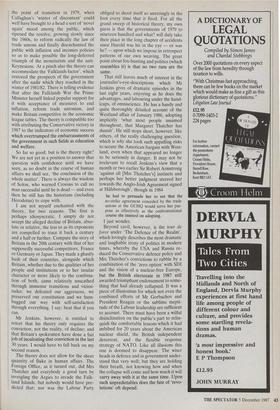The causes of the English Revolution
J. Enoch Powell
MRS THATCHER'S REVOLUTION by Peter Jenkins Cape, f12.95 Mrs Thatcher's Revolution is a book difficult to categorise. It is a running commentary on the British political scene from 1964 to 1987 which, although well larded with statistics electoral, economic and social, is of the impressionistic, not to say journalistic, character of the commen- taries which weekly entertain those who read the political columns in the leading Sunday newspapers. Unavoidably perhaps, this aspect of the book becomes dominant as recent events, especially party fortunes, personalities and prospects before, during and after the 1987 general election, are reached.
Mr Jenkins, however, is attempting also to do something different, namely, to establish a theory which will provide a satisfying explanation of the durability and success of the series of Conservative gov- ernments installed and confirmed in power at the elections of 1979, 1983 and 1987. This attempt, being interpretative rather than descriptive, was bound to reflect the author's own world of ideas and values and will fail to convince those who inhabit other worlds.
So far as I have understood it — and there are points where the theory has to be rather violently wrenched to fit events — it is, in summary, as follows. Since the second world war, and historically long before that, Britain has been a nation in relative, and more recently in absolute, decline due to the contrast between its educational and social attitudes and those of other nations. During three decades after 1945 the perception of this fact was held at bay by the British public, and its implications were fought off by govern- ments and political parties. At last, at the end of the 1970s — and this was what precipitated the 'revolution' — the public's eyes were opened and Britain was thereby enabled to come to terms with whatever would be necessary to end and to reverse its decline. Hence the re-election of a government under which unemployment stuck at over three million, which substi- tuted for redistributive policies the en- couragement and reward of successful en- terprise and the creation of a large share- owning electorate, which legislated to withdraw the entrenched privileges of the trade unions, and under which the north- south divide between obsolescence and innovation, decline and competitiveness, became a marked feature of the political landscape. The theory purports too to explain how Conservative predominance has been buttressed by the erosion of the Labour Party's natural consitituency in the working class associated with declining manufacturing industry and the failure of the Labour Party to fill the gap by making inroads into a middle class enjoying and exploiting the fruits of competitive technol- ogy. The theory makes a reasonable 'fit' at the point of transition in 1979, when Callaghan's 'winter of discontent' could well have brought to ahead a sort of 'never again' mood among the public, which ripened the resolve, growing slowly since the 1960s, to reform radically the law of trade unions and finally disenchanted the public with inflation and incomes policies so as to make possible the long-deferred triumph of the monetarists and the anti- Keynesians. At a pinch also the theory can accommodate the 'Falklands factor', which restored the prospects of the government after the nadir which they reached in the winter of 1981/82. There is telling evidence that after the Falklands War the Prime Minister herself linked popular support for it with acceptance of measures to end inflation, reform trade unionism, and make Britain competitive in the economic league tables. The theory is compatible too with attributing the Conservative victory in 1987 to the indicators of economic success which overtrumped the embarrassments of the government in such fields as education and welfare.
So far so good; but is the theory right? We are not yet in a position to answer that question with confidence until we have seen, as no doubt in the course of human affairs we shall see, 'the conclusion of the whole matter'.. There is always the wisdom of Solon, who warned Croesus to call no man successful until he is dead — and even then he still has the historians (including Herodotus) to cope with.
I am not myself enchanted with the theory, for two reasons. The first is perhaps idiosyncratic. I simply do not accept the alleged decline of Britain, abso- lute or relative, the less so as its exponents are compelled to trace it back a century and a half or further. Compare the story of Britain in the 20th century with that of her supposedly successful competitors, France or Germany or Japan. They made a ghastly hash of their countries, alongside which Britain, whether due to the qualities of her people and institutions or to her insular character or more likely to the combina- tion of both, came relatively unscathed through immense transitions and vicissi- tudes: we defeated our aggressors, we preserved our constitution and we hum- bugged our way with self-satisfaction through everything. I say: beat that if you can.
Mr Jenkins, however, is entitled to retort that his theory only requires the conviction, not the reality, of decline; and that Britain's spokesmen have done a fair job of inculcating that conviction in the last 30 years. I would have to fall back on my second reason.
The theory does not allow for the sheer quantity of fluke in human affairs. The Foreign Office, as it turned out, did Mrs Thatcher and everybody a good turn by inveigling the Argies to invade the Falk- land Islands, but nobody would have pre- dicted that; nor was the Labour Party obliged to shoot itself so unerringly in the foot every time that it fired. For all the grand sweep of historical theory, my own guess is that the governments of 1979 to nineteen hundred and what? will duly take their place in the long chapter of accidents since Harold was hit in the eye — or was he? — upon which we impose in retrospect patterns of our own weaving. The great point about fox-hunting and politics (which resembles it) is that no two runs are the same.
That still leaves much of interest in the journalist's-eye-descriptions which Mr Jenkins gives of dramatic episodes in the last eight years, enjoying as he does the advantages, and labouring under the hand- icaps, of omniscience. He has a handy and quite thoroughly detailed account of the Westland affair of January 1986, adopting implicitly 'what most people assumed throughout, that Margaret Thatcher has dunnit'. He still stops short, however, like others, of the really challenging question, which is why she took such appalling risks to secure the American bargain with West- land, even when that appeared no longer to be seriously in danger. It may not be irrelevant to recall Jenkins's view that a month or two earlier Sir Robert Armstrong `against all [Mrs Thatcher's] instincts and perhaps her better judgment steered her towards the Anglo-Irish Agreement signed at Hillsborough', though in 1984
he had to persuade her to see that the no-strike agreement conceded by the trade unions at the GCHQ would serve her pur- pose as effectively as the confrontational course she insisted on adopting.
I just wonder.
Beyond cavil, however, is the tour de force under 'The Defence of the Realm', which lovingly describes the most dramatic and laughable irony of politics in modern times, whereby the USA and Russia re- duced the Conservative defence policy and Mrs Thatcher's convictions to rubble by a combination of the 'zero option' with SDI and the vision of a nuclear-free Europe, but the British electorate in 1987 still awarded triumphant endorsement to some- thing that had already collapsed. It was a piece of illusionism for which not even the combined efforts of Mr Gorbachov and President Reagan or the sublime inepti- tude of the Labour leadership are sufficient to account. There must have been a wilful disinclination on the public's part to relin- quish the comfortable lessons which it had imbibed for 20 years about the American nuclear shield, the British independent deterrent, and the flexible response strategy of NATO. Like all illusions this one is doomed to disappear. The wiser heads in defence and in government under- stand that very well; but they are holding their breath, not knowing how and when the collapse will come and how much it will carry away with it at the same time. Upon such unpredictables does the fate of 'revo- lutions' oft depend.











































































 Previous page
Previous page